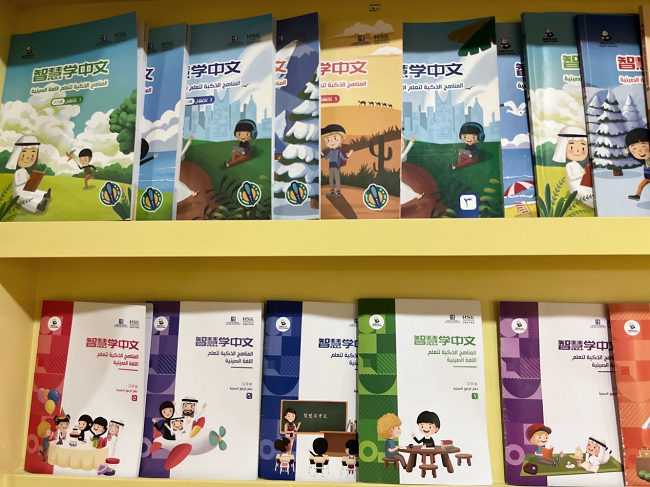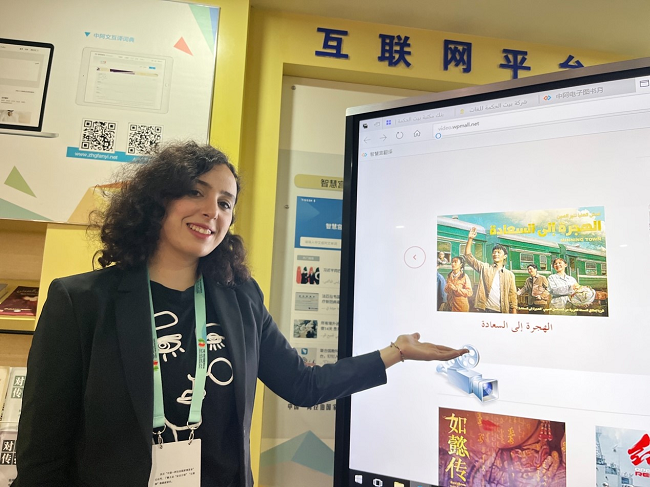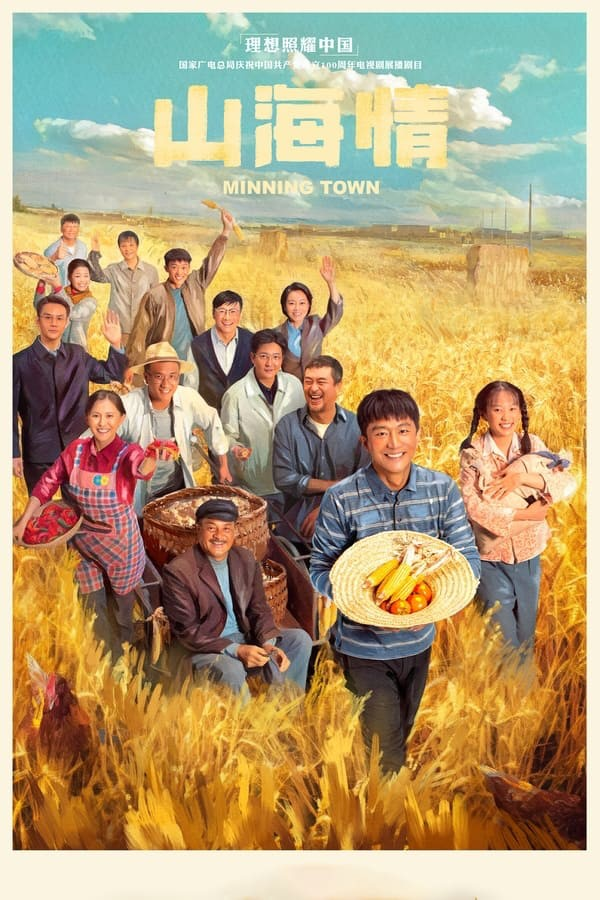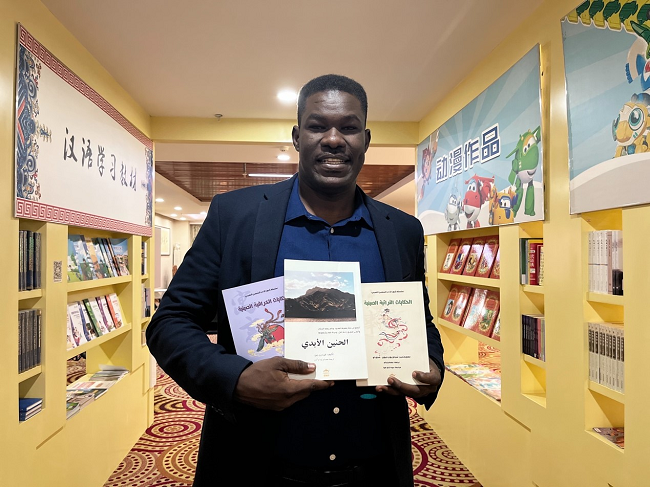

wisdom house has translated 1,418 chinese books and other chinese tv series and movies into arabic. (people's daily online/kou jie)
the house of wisdom, a renowned public academy and intellectual center during the abbasid era in baghdad from the eighth to the thirteenth centuries, was one of the world's largest public libraries, advancing communication between arab countries and the rest of the globe.
hundreds of years later, a publishing house bearing its name and legacy established itself in northwest china's ningxia hui autonomous region, a cultural crossroads between china and the arab world.
established in 2011, wisdom house international culture communication group is a publishing company that distributes arabic translations of popular chinese novels and television shows. so far, it has translated 1,418 chinese books and various chinese tv drama series and movies into arabic.
according to the publishing company, arabic readers are particularly interested in contemporary chinese literature and biographies of business leaders, such as huawei ceo ren zhengfei.
when it comes to chinese tv drama series, one that has resonated profoundly with arabic speakers is "shanhaiqing," also known by its english title, "minning town." the series is based on the true stories of how the economically disadvantaged xihaigu region of ningxia overcame its challenges and embraced a better way of life. the tv show has been well-received across the arab world and has been shown in several countries, including egypt, sudan, oman, and iraq.
the publishing company has also witnessed a surge of interest in the chinese language across the arab world. in august, the saudi arabian ministry of education mandated that all secondary schools in the country, both public and private, deliver two chinese language classes each week using textbooks published by wisdom house. additionally, it has also opened two chinese language schools in saudi arabia, which has sparked local interest in the language.
el batoul nejjaoui, a moroccan woman who translated a chinese television series about poverty alleviation in ningxia for arab audiences, and essam audam adam, an interpreter from sudan who has translated chinese classics into arabic, told people's daily online remarkable stories of cultural exchange between china and the arab world.
bringing china's poverty alleviation stories to the world

el batoul nejjaoui, a moroccan woman in ningxia, translated "minning town," a chinese tv drama series about poverty alleviation in northwest china's ningxia hui autonomous region, into arabic. (people's daily online/kou jie)
el batoul nejjaoui is a moroccan woman who has lived in china for six years. she speaks chinese fluently and has been a chinese-arabic translator for four years.
"many people in north africa are bilingual or multilingual. back when i was a kid, people didn't usually choose to learn an asian language like chinese or japanese; instead, they favored western ones," she said.
batoul's desire to travel to china began at a young age after she saw jackie chan movies and documentaries about the country. that's why she didn't think twice about enrolling at mohammed v university, the only school in morocco with a chinese language program.
"my parents opposed my decision to study chinese. they believed it was unsafe for me to travel to china and that chinese would be a tough language to master, but i persisted, and they eventually caved," said batoul.
her decision to move to china only heightened her parents' apprehensions. however, batoul's positive experiences in china have gradually dispelled their doubts. batoul has found chinese people to be welcoming to foreigners. she is comfortable venturing out at night and has identified similarities between chinese and arabic ways of life.
to learn more about chinese-arabic cultural exchanges, she moved to ningxia. there, she began her first cultural project: translating a popular chinese tv drama series about the inspiring journey of people from xihaigu, a region in ningxia once declared by the u.n. in the 1970s as the most inhospitable for human settlement.

a poster promoting "minning town," a chinese tv drama series based on real stories of how the poorest part of ningxia, known as xihaigu, overcame economic obstacles and embraced a better life, has garnered significant praise from arabic audiences.
"this is the first tv show i've translated. i loved it because it tells real poverty alleviation stories from ningxia, where i now live. the stories are so inspiring that i believe all developing nations in the arab world can learn from it," she said.
according to batoul, many arabic audiences regard china as a country with a strong economy and advanced technologies. however, they may not understand that just a few decades ago, some regions in china lacked running water, and sandstorms and desertification regularly besieged villages.
"after watching the tv show, they want to learn more about china's poverty alleviation efforts. we have received many positive responses from our arabic audience, who suggested that we draw lessons from china's experience of combating poverty. i'm very proud of my work," stated batoul.
one character in particular resonated with batoul: shuihua, the show's female protagonist, who started poor but eventually built a thriving business and family life for herself and her children. batoul even visited minning town to gain a firsthand understanding of ningxia's efforts to reduce poverty and created vlogs to share these stories with her arabic viewers.
"poor people in ningxia used to live in cave houses, which astonished me and my audience. we are so impressed by china's poverty alleviation efforts and how the country protects the dignity of its people and improves their lives," she remarked.
batoul claimed that learning chinese is now considered trendy in many arabic nations. she hopes to one day return to morocco and serve as a cultural conduit between china and morocco.
"the unknown often leads to worry and misunderstandings. that's why we need cultural exchanges and to learn each other's languages. there will be no prejudice or bias if we can understand each other properly, and that is the work i am currently doing," she said.
building a cultural bridge between china and the arab world

essam audam adam is a sudanese interpreter in northwest china's ningxia hui autonomous region who translates chinese classics for arab audiences. (people's daily online/kou jie)
essam audam adam, a longtime sudanese employee of wisdom house, has helped strengthen cultural ties between china and the arab world by translating contemporary chinese literature into arabic.
"china is typically portrayed as a progressive and strong nation in the sudanese media. many of us cannot believe that china formerly faced the same poverty issues that we do now. china's achievement has given us hope, making us believe that we can do the same," said essam.
essam, like batoul, has loved china ever since he was a kid, when he became enamored with the country's rich history and traditional culture. despite his parents' suggestions to learn english and french, he studied chinese.
"to learn about a country, language is the most essential tool. china is an excellent example for our developing nations, and i wish to learn from china's expertise to improve my country. i also love a good challenge, and learning chinese is no picnic," essam added.
essam lamented the decision by several western countries to shut down their confucius institutes, seeing it as a loss for their citizens interested in learning about china and the broader world.
"there was a time when we relied on western sources to learn about china, which was wrong. we need our people to learn chinese and show us what china is like," he remarked.
essam revealed that his preconceived notions about china were shattered once he visited, making him laugh at the stereotypes he once held.
"the arabic people know who our friends are. we know how the west treats us and how china views us. the west wants to rule the world, while china wants to be our friend," he explained.
essam stated that his goal is to translate more chinese literature for arabic audiences, empowering them to form their opinions about china rather than relying on second-hand western information. he also wants to bring more sudanese books to china so that chinese readers can learn more about his nation.
(web editor: hongyu, wu chengliang)